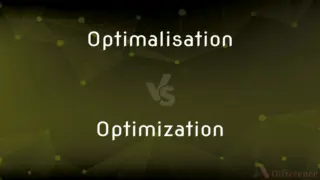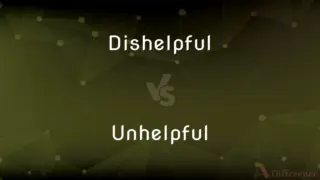Rilly vs. Really — Which is Correct Spelling?
Edited by Tayyaba Rehman — By Fiza Rafique — Updated on April 1, 2024
"Rilly" is a misspelling, while "Really" is the correct spelling, used to emphasize or ask if something is real or true.

Table of Contents
Which is correct: Rilly or Really
How to spell Really?

Rilly
Incorrect Spelling

Really
Correct Spelling
ADVERTISEMENT
Key Differences
Practice spelling “Really” regularly in writing.
Use mnemonic devices, like "Read Every Alphabetic Letter Lightheartedly Yearly," to remember its spelling.
Associate “Really” with its many uses in daily conversations, reinforcing its proper spelling.
Think of the phrase “Real Ally” which sounds like "Really" and reminds you of its correct spelling.
Consider the root word “Real” before adding the suffix "-ly."
ADVERTISEMENT
How Do You Spell Really Correctly?
Incorrect: She said she was rilly excited about the trip.
Correct: She said she was really excited about the trip.
Incorrect: Do you think he rilly meant what he said?
Correct: Do you think he really meant what he said?
Incorrect: The movie was rilly good, better than I expected.
Correct: The movie was really good, better than I expected.
Incorrect: Rilly, I didn't expect to see you here.
Correct: Really, I didn't expect to see you here.
Incorrect: I can't believe it's rilly happening.
Correct: I can't believe it's really happening.
Really Definitions
Used to emphasize a statement or opinion.
That movie was really good.
Used to express surprise or wonder.
Do you really think so?
Truly; genuinely.
Is this really your decision?
In actual truth or fact
There isn't really a lake there.
It's just a mirage.
To a great degree; very much
I would really like to meet your sister.
Very; utterly
That was a really enjoyable evening.
Without a doubt; indeed
Really, I don't want more dessert.
Used to express surprise, skepticism, displeasure, or interest
"I've been reading her diary." "Really?".
(literal) In a way or manner that is real, not unreal.
(modal) Actually; in fact; in reality.
"He really is a true friend." / "Really? What makes you so sure?"
Very (modifying an adjective); very much (modifying a verb).
But ma, I really, really want to go to the show!
Indicating surprise at, or requesting confirmation of, some new information; to express skepticism.
A: He won the Nobel Prize yesterday.
B: Really?
Indicating that what was just said was obvious and unnecessary; contrived incredulity
A: I've just been reading Shakespeare - he's one of the best authors like, ever!
B: Really.
Indicating affirmation, agreement.
A: That girl talks about herself way too much.
B: Really. She's a nightmare.
Indicating displeasure at another person's behaviour or statement.
Well, really! How rude.
Royally.
In a real manner; with or in reality; actually; in truth.
Whose anger is really but a short fit of madness.
Why, really, sixty-five is somewhat old.
In accordance with truth or fact or reality;
She was now truly American
A genuinely open society
They don't really listen to us
In actual fact;
To be nominally but not actually independent
No one actually saw the shark
Large meteorites actually come from the asteroid belt
In fact (used as intensifiers or sentence modifiers);
In truth, moral decay hastened the decline of the Roman Empire
Really, you shouldn't have done it
A truly awful book
Used as intensifiers; `real' is sometimes used informally for `really'; `rattling' is informal;
She was very gifted
He played very well
A really enjoyable evening
I'm real sorry about it
A rattling good yarn
Used to ask for confirmation.
Is he really coming?
Very or very much.
I'm really tired.
Really Meaning in a Sentence
It's really important to eat healthy foods.
She was really surprised by the birthday party.
The story he told was really interesting.
This book is really good; I can't put it down.
He really wants to learn how to play the guitar.
I really appreciate all the help you've given me.
I really hope I can visit you this summer.
I really enjoyed the concert last night.
It's really cold outside today, so dress warmly.
She's really excited about starting college.
I really can't believe how fast this year has gone by.
They really like going on hikes in the mountains.
She really knows how to make everyone laugh.
The test was really hard, but I think I did well.
We really need to start saving money for our trip.
He's really good at math and science.
The game was really fun, and we won!
I really love spending time with my family.
The movie was really sad; I cried at the end.
He really made an effort to be more punctual.
Really Idioms & Phrases
Really a dime a dozen
To describe something that is very common or not unique.
Those types of complaints are really a dime a dozen and don't surprise the customer service team anymore.
Really pulling your leg
To joke or to trick someone in a playful manner.
I was really pulling your leg when I said I'd seen a unicorn in my backyard.
Really caught between a rock and a hard place
To be in a situation where one has to choose between two equally tough decisions.
He was really caught between a rock and a hard place, having to choose between two great job offers.
Really over the moon
To be extremely pleased or happy about something.
She was really over the moon when she got the job offer.
Really hit the nail on the head
To describe something very accurately or to do something perfectly.
When she spoke about the importance of kindness, she really hit the nail on the head.
Common Curiosities
Why is it called Really?
"Really" comes from the root word "real," with the suffix "-ly" to indicate its adverbial form.
What is the verb form of Really?
"Really" is an adverb and does not have a verb form.
Which vowel is used before Really?
"A" is used before the “l.”
Is Really an abstract noun?
No, "really" is not a noun.
What is the pronunciation of Really?
It is pronounced /ˈriːəli/.
What is the root word of Really?
The root word is "real."
Which article is used with Really?
Articles are not typically used directly before "really."
Is Really a noun or adjective?
"Really" is neither; it's an adverb.
What is the plural form of Really?
Adverbs don’t have plural forms.
Which preposition is used with Really?
Prepositions aren’t typically paired directly with "really."
Which conjunction is used with Really?
Conjunctions can be used before or after "really" depending on the context.
What is the singular form of Really?
"Really" is an adverb and doesn't have a singular form.
Is Really a countable noun?
"Really" is not a noun.
How many syllables are in Really?
3 syllables.
Is Really an adverb?
Yes, "really" is an adverb.
Is Really a negative or positive word?
It is neutral; it can be used in both positive and negative contexts.
Is the Really term a metaphor?
No, "really" is not used as a metaphor.
What part of speech is Really?
It is an adverb.
Which determiner is used with Really?
Determiners are not typically used directly with "really."
Is the word Really imperative?
No, "really" is not imperative.
Is the word Really a gerund?
No, "really" is not a gerund.
What is a stressed syllable in Really?
The first syllable, "real," is stressed.
How is Really used in a sentence?
"I really appreciate your help."
Is the word “Really” a Direct object or an Indirect object?
"Really" is an adverb and cannot be an object.
How do we divide Really into syllables?
re-al-ly.
What is another term for Really?
Truly.
Is Really a vowel or consonant?
"Really" is a word containing both vowels and consonants.
Is Really a collective noun?
No, "really" is not a noun.
What is the opposite of Really?
Not really or barely.
Share Your Discovery

Previous Comparison
Optimalisation vs. Optimization
Next Comparison
Dishelpful vs. UnhelpfulAuthor Spotlight
Written by
Fiza RafiqueFiza Rafique is a skilled content writer at AskDifference.com, where she meticulously refines and enhances written pieces. Drawing from her vast editorial expertise, Fiza ensures clarity, accuracy, and precision in every article. Passionate about language, she continually seeks to elevate the quality of content for readers worldwide.
Edited by
Tayyaba RehmanTayyaba Rehman is a distinguished writer, currently serving as a primary contributor to askdifference.com. As a researcher in semantics and etymology, Tayyaba's passion for the complexity of languages and their distinctions has found a perfect home on the platform. Tayyaba delves into the intricacies of language, distinguishing between commonly confused words and phrases, thereby providing clarity for readers worldwide.







































